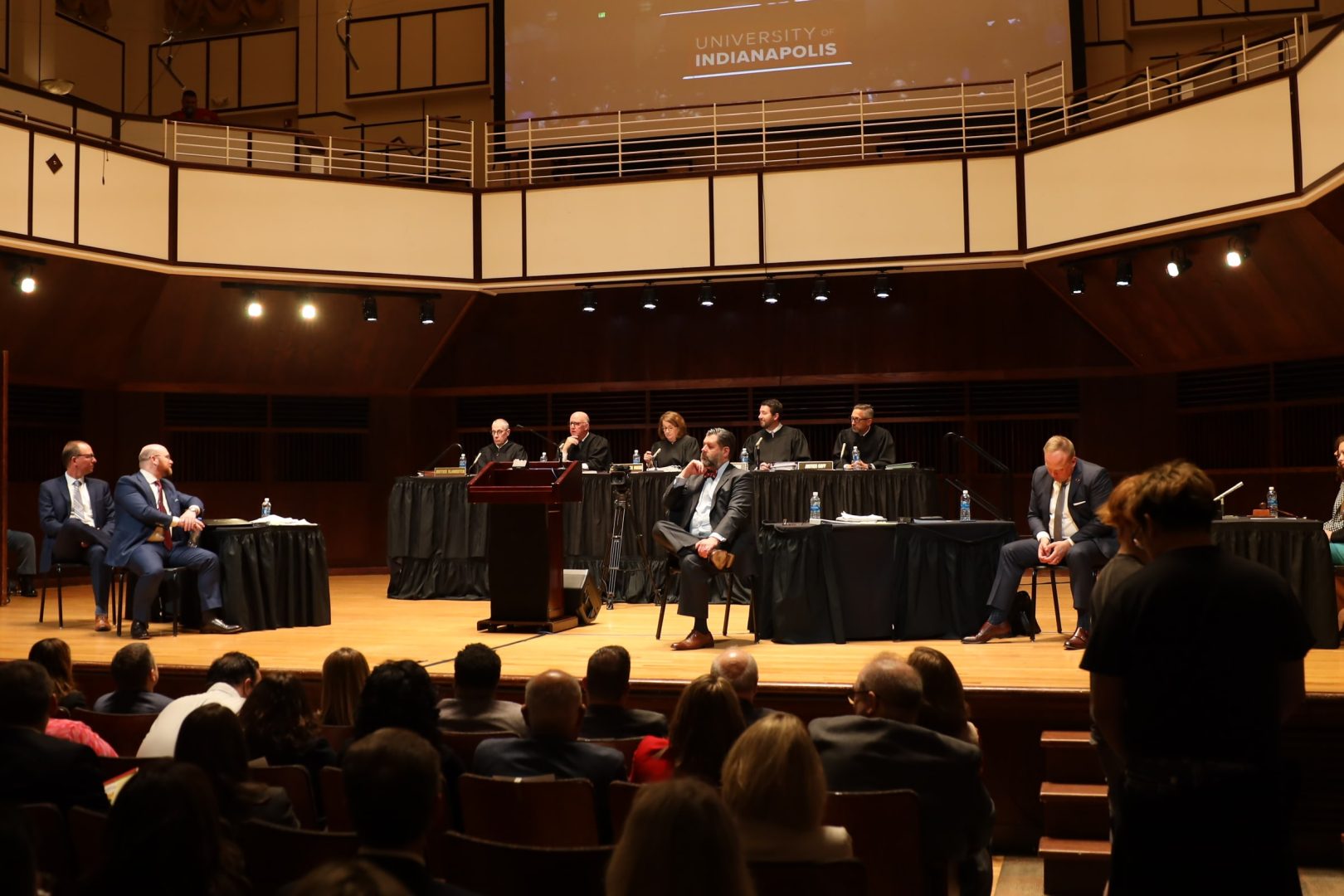The Indiana State Supreme Court visited the University of Indianapolis’ campus to hear oral arguments for a class action lawsuit on Tuesday, April 11 in Ruth Lilly Performance Hall.
According to the press release from the Indiana Judicial Branch, UIndy students and professors, judiciary and legislative professionals, media, high school students from across the state, the six state supreme court justices and others listened to the traveling arguments from lawyers from both parties in the Keller J. Mellowitz v. Ball State University, Board of Trustees of Ball State University, and State of Indiana case.

The synthesis provided by the Indiana Supreme Court’s Office of Communication, Education and Outreach said the class action lawsuit being discussed on campus was brought about by a BSU student claiming the university breached the student-university contract and provided “unjust enrichment” during the COVID-19 pandemic. The arguments heard in the performance hall were about an appeal by Mellowitz regarding the Marion Superior Court’s ruling for him to amend his original complaint to comply with a law passed about COVID-19-related class action lawsuits. The superior court’s ruling then went to the Court of Appeals and was reversed. The reversal was then challenged by BSU and Indiana’s supreme court assumed jurisdiction over the case.
Senior political science student, President of the Pre-Law Society Registered Student Organization and Treasurer of the Janus Club Megan Tadevich—who plans to attend the Indiana University McKinney School of Law after graduation—served as the honorary bailiff for the hearing on campus. Bailiffs gavel a court into and out of session.
“It was super cool,” Tadevich said. “I didn’t really realize how involved I would be. I didn’t know I’d have this script to follow. I didn’t know I’d actually be banging the gavel. I thought it was more like a title type of thing. But it was super cool to be able to be interacting with the real bailiff. And I got to shake one of the justice’s hands, which felt unreal… This is what I want to do with my life, [to be] in the courtroom. So to be able to be more than [on] the outside looking in was really cool.”
Senior political science student and 2022-2023 President of UIndy Democrats Pricilla Garcia—who also plans to attend the IU McKinney School of Law after graduation—served as a building escort to Chief Justice Loretta Rush and was able to converse with her one-on-one.
“She is such a respectable woman and I admire her so much, and I am so thankful to have had the opportunity to meet her and to meet all of the justices…,” Garcia said.
Tadevich and Garcia both thought the supreme court’s visit to UIndy was a noteworthy, real-life experience with the judicial branch.
“I thought it was incredible,” Tadevich said. “…It was really cool to see real lawyers in a real time case that’s not like a TV drama.”
“I thought it was such a unique experience that I think I was very fortunate to be able to witness that,” Garcia said. “And I think a lot of other students can agree to that, that it was such an impactful visit, for especially someone like me, who is aspiring to go to law school, to be able to kind of see their session in action and seeing how the lawyers interact with one another… And so I think overall, the visit was very amazing and such a great honor and privilege for the students.”
Tadevich said the supreme court was supposed to visit UIndy’s campus in 2020 by invitation of political science professor Laura Wilson, but the COVID-19 pandemic pushed the event back.
“…I want to say Chief Justice Loretta Rush was here in 2018 and visited Dr. [professor] Wilson’s classes and everything,” Tadevich said. “And then they had planned to hear a case on campus… So in April of 2020, they were supposed to be here with the high schools coming to us. But obviously COVID[-19] hit and everything fell apart.”
The IN Supreme Court’s visit to UIndy was only the 49th time they have traveled outside the State House to hear oral arguments since 1994, according to Rush.
“I think having that accessibility and that transparency is really really cool,” Tadevich said. “I understand logistically that [hearing traveling arguments has] a lot of moving parts [and] that’s not a super sustainable way to do it. But my honors project was about public opinion and the Supreme Court, and seeing that dynamic. So it’s really cool to be able to see [how] they’re interacting with the public, but they’re not accounting for what the public may or may not want. It was really cool to see that.”
The recording of the hearing at UIndy’s campus can be found at Courts.IN.gov.








